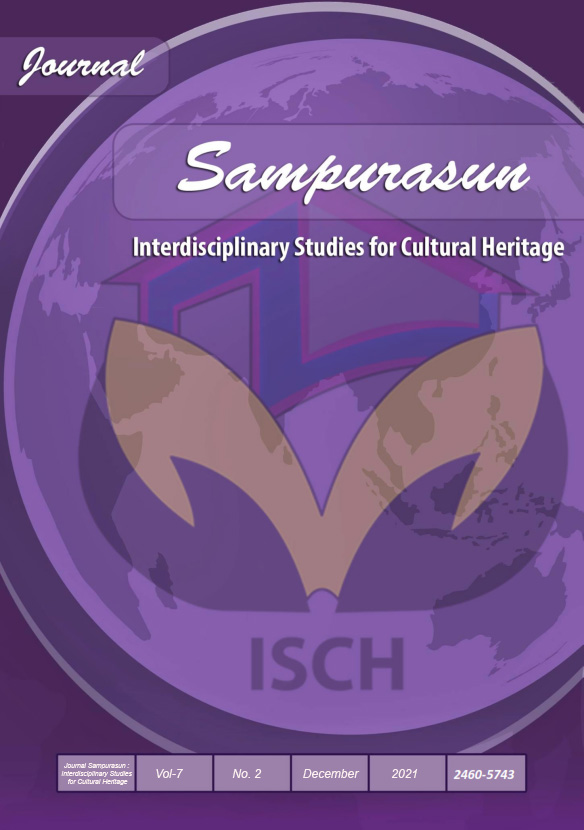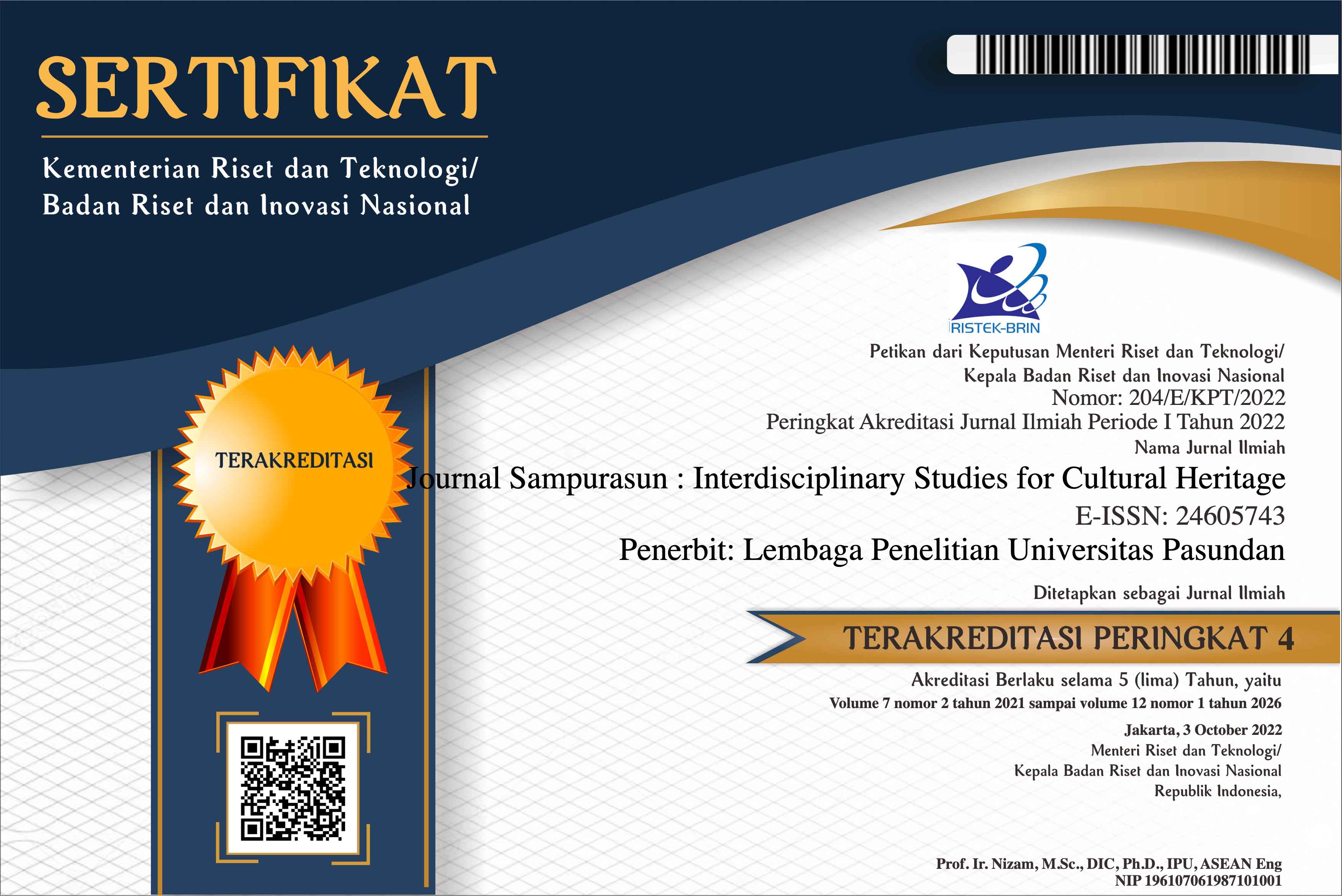COMMUNITY SERVICE IMPOSED UPON THE CONVICTED CORRUPTOR IN ACTUALIZING LOCAL WISDOM AS CULTURAL HERITAGE
DOI:
https://doi.org/10.23969/sampurasun.v7i2.3217Keywords:
Inmates Intervention Program, Corruption, Community service sanctionAbstract
Optimizing social work crime for convicted corruption is interpreted as an effort to provide positive value to the community in addition to reducing the burden on the state, both the burden of costs incurred by the state in fostering convicts and the burden of coaching, because the convicted person has more specific competencies both in the scientific field, authority as well as in other fields compared to the competency of the guiding apparatus without intending to play down the capabilities of the coaching apparatus, besides the security burden that must be carried out by the state, because given the provision of criminal work, the obligation to carry out criminal offenses is transferred to convicts not to the state , and the benefits felt not only for the country but also for the people ,because the competency of the perpetrators can be useful, and it becomes a legal effort in actualizing local wisdom, because the sanctions applied are more concentrated on the needs of the community and community-based coaching, and prison is no longer the only coaching institution for perpetrators of corruption, so It is expected that the recommendations for the renewal of the Criminal Code and the Corruption Law can achieve the goal of punishment, namely providing deterrence for perpetrators and also providing positive benefits for the community while reducing the burden on the state.
Downloads
References
(1), 1–5. https://doi.org/10.22460/q.v1i1p1-10.497
Batubara, Gialdah T, & Susanto, A. F. (2017). Pola Penegakan Hukum Pidana Berdasarkan Nilai-Nilai Kemanusiaan Dalam Perspektif Asas Manfaat. Jurnal Litigasi, 18(1), 41–86. https://journal.unpas.ac.id/index.php/litigasi/article/view/287/521
Batubara, Gialdah Tapiansari, & Arifin, F. (2019). Model Pendidikan Hukum Dalam Upaya Mewujudkan Kesadaran Hukum Siswa Sejak Dini. Litigasi, 20(1), 20–56. https://doi.org/10.23969/litigasi.v20i1.2106
Casram, C., & Dadah, D. (2019). Posisi Kearifan Lokal Dalam Pemahaman Keagamaan Islam Pluralis. Jurnal Studi Agama-Agama Dan Lintas Budaya, 3(2), 161–187. https://journal.uinsgd.ac.id/index.php/Religious/article/view/4739/pdf
Dwisvimiar, I. (2011). Keadilan Dalam Perspektif Filsafat Ilmu Hukum. Jurnal Dinamika Hukum, 11(3), 522–531. https://doi.org/10.20884/1.jdh.2011.11.3.179
Effendi, N. (2015). Kearifan Lokal Menuju Penguatan Karakter Sosial: Suatu Tantangan Dari Kemajemukan Budaya Di Sumatera Barat. Jurnal Antropologi: Isu-Isu Sosial Budaya, 16(2), 107–115. http://jurnalantropologi.fisip.unand.ac.id/index.php/jantro/article/view/27
Firdaus, R. G. (2020). Pembelajaran Cinta Lingkungan Berdasarkan Pembentukan Karakter dan Penerapan Konsep 3R. Journal Simposium Nasional Mulitidisiplin, 2. http://jurnal.umt.ac.id/index.php/senamu/article/view/3489/2380
Hidayatuloh, S. (2019). Nilai-Nilai Kearifan Lokal Upacara Adat Ngikis Di Situs Karangkamulyan Kabupaten Ciamis. Patanjala: Jurnal Penelitian Sejarah Dan Budaya, 11(1 Maret), 97–113. https://www.neliti.com/publications/291830/nilai-nilai-kearifan-lokal-upacara-adat-ngikis-di-situs-karangkamulyan-kabupaten
kaleidoskop-2018-3-vonis-kasus-korupsi-paling-berat-dan-ringan-tahun-ini. (n.d.).
Safrijal, A. (2013). Penerapan Sanksi Adat dalam Penyelesaian Perkara Pidana di Kabupaten Nagan Raya. Kanun Jurnal Ilmu Hukum, 15(1), 145–162. https://doi.org/10.24815/kanun.v15i1.6165
Septiningsih, L. (2015). Membangun Karakter Bangsa Berbasis Sastra: Kajian Terhadap Materi Karya Sastra Di Sekolah Menengah Atas. Jurnal Pendidikan Dan Kebudayaan, 21(1), 71–85. https://jurnaldikbud.kemdikbud.go.id/index.php/jpnk/article/view/177/159
Susanto, A. F., & Batubara, G. T. (2016). Penelitian Hukum Transformatif Partisipatoris: Sebuah Gagasan Dan Konsep Awal. Jurnal Litigasi, 17(2), 3314–3376. https://doi.org/http://dx.doi.org/10.23969/litigasi.v17i2.159
Wagiati, W., & Zein, D. (2018). Pemertahanan Bahasa Sunda Dalam Upacara Pernikahan Tradisional Di Kabupaten Bandung. Jurnal Pendidikan Dan Kebudayaan, 3(2), 186–201. https://jurnaldikbud.kemdikbud.go.id/index.php/jpnk/article/view/1031
Wardhani, N. S., Hartati, S., & Rahmasari, H. (2016). Sistem Pembinaan Luar Lembaga Bagi Narapidana Yang Merata Dan Berkeadilan Berperspektif Pada Tujuan Pemasyarakatan. Jurnal Hukum & Pembangunan, 45(1), 1. https://doi.org/10.21143/jhp.vol45.no1.7
Yustia, D. A., Rastuti, T., & Fatimah, U. D. (2015). Mendobrak Kelemahan Litigasi Konvensional Melalui Model Advokasi Mandiri Dalam Rangka Pembaharuan Proses Peradilan. Jurnal Litigasi, 16, No. 1(April). https://doi.org/http://dx.doi.org/10.23969/litigasi.v16i1.51
Downloads
Published
Issue
Section
License
Copyright Notice
Authors should not withdraw their submitted papers because the withdrawal wastes voluntary works devoted by an associate editor and reviewers. But, we accept the withdrawal of a submitted paper if authors have unavoidable reasons. In the event that a manuscript is to be withdrawn from submission to Sampurasun Journal, a letter must be sent to the editorial office requesting withdrawal by e-mail (sampurasunjournal@unpas.ac.id) with its scanned PDF file, before the notification of acceptance for publication.
The withdraw request letter must include the following information. Paper ID, Paper title, Authors names, Reason why the paper must be withdrawn, and Date and signatures of all the authors (or signature of the contact author).
If only the contact author signs the letter, he/she must obtain the agreement of the withdrawal from all the other authors and the letter must include the description that all the other authors agreed the withdrawal. The journal will not withdraw a manuscript from peer review until such a letter has been received. Authors must not assume their manuscript has been withdrawn until they have received appropriate notification from the editorial office. Withdrawal of a manuscript subsequent to acceptance for publication will only be granted in the most exceptional of circumstances.
After the paper is accepted for publication, the withdrawal is not permitted in principle. The authors must always pay the charge even if the withdrawal is permitted. Any request of withdrawal that does not follow the above procedure is treated as invalid. If illegal submission, e.g., plagiarized or duplicate submission, is found for a paper, the withdrawal of the paper will never be permitted and the authors will be punished based on the rule. It is not acceptable practice to withdraw a manuscript in the event of acceptance at another journal. This constitutes dual submission. The editorial office of the other journal will be notified of your actions. In such circumstances Sampurasun ISCH may chose to impose appropriate punitive action subject.
Withdrawal Penalty
Author is not allowed to withdraw submitted manuscripts, because the withdrawal is waste of valuable resources that editors and referees spent a great deal of time processing submitted manuscript, money and works invested by the publisher. If author still requests withdrawal of his/her manuscript when the manuscript is still in the peer-reviewing process, author will be punished with paying $200 per manuscript, as withdrawal penalty to the publisher. However, it is unethical to withdraw a submitted manuscript from one journal if accepted by another journal. The withdrawal of manuscript after the manuscript is accepted for publication, author will be punished by paying US$500 per manuscript. Withdrawal of manuscript is only allowed after withdrawal penalty has been fully paid to the Publisher. If author don't agree to pay the penalty, the author and his/her affiliation will be blacklisted for publication in this journal. Even, his/her previously published articles will be removed from our online system.


















